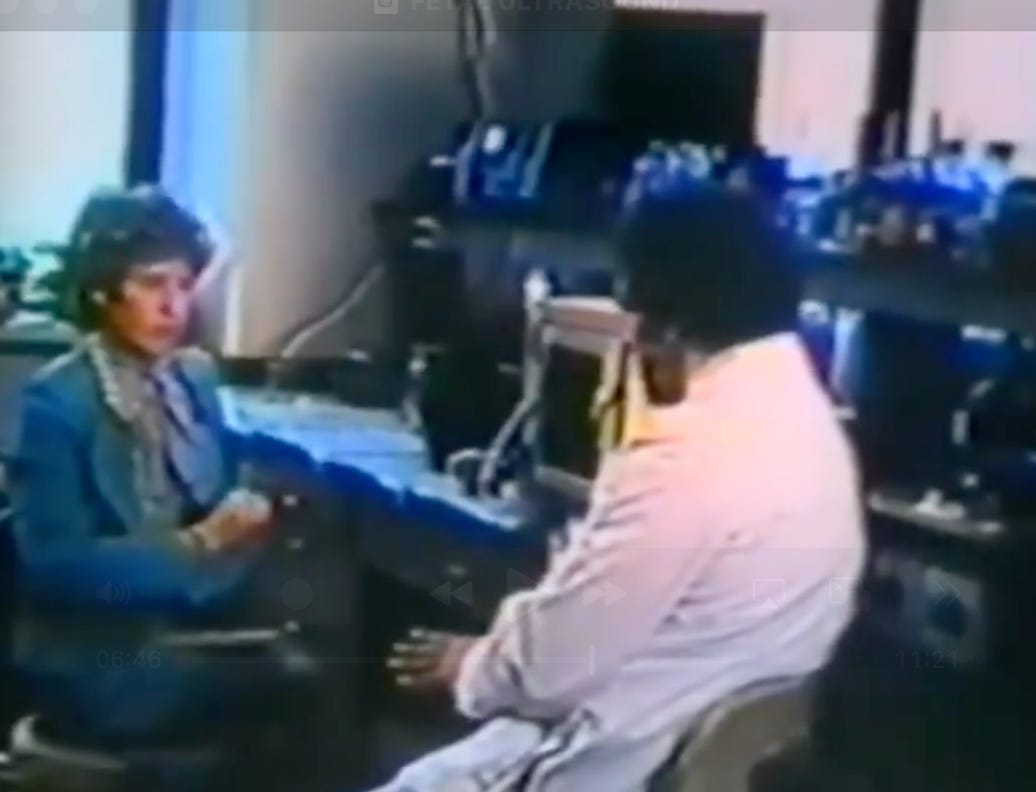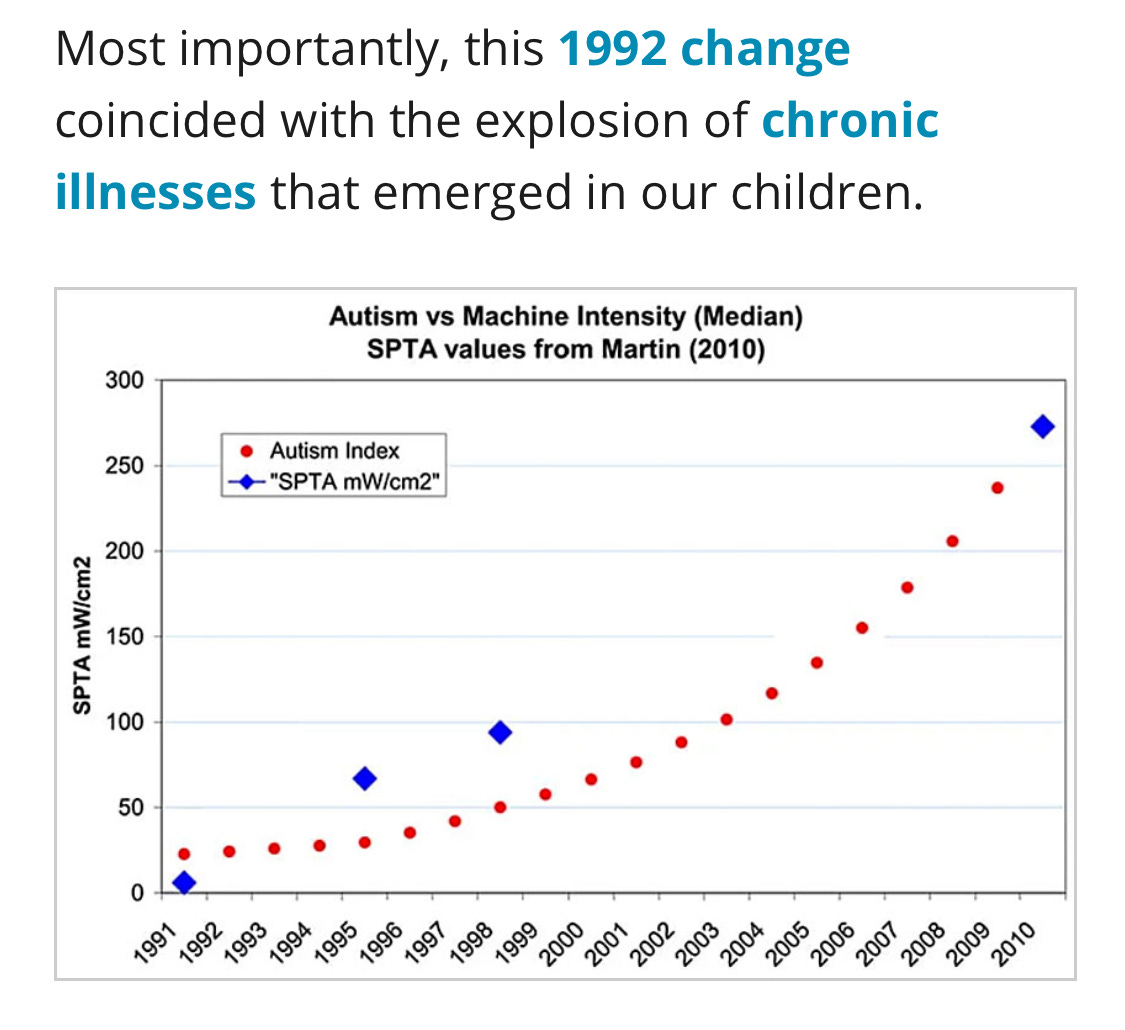The Fetal Ultrasound is A Lie
It's Not Just "Sound Waves" -- It's Damaging, Non-ionized Radiation
In 1923, they were doing harmful fetal x-rays that didn't stop until 1973, only to be replaced by non-ionizing radiation in the form of the fetal ultrasound. And now we have yet another mistake that is being repeated, for decades.
We previously brought you the fact that "BRAIN DEATH" IS A LIE TO PROCURE ORGANS.
Now let’s look at the explanation of yet another lie in a 1983 CNN video and transcript, to be sure we understand just what a fetal ultrasound is, what the FDA did with early safety information on it, and the possible adverse events.
You can read the transcript, and/or watch the 11+ minute video.
FETAL EFFECTS OF ULTRASOUND: A GROWING CONTROVERSY
Cable News Network for Educational Use Only
The Video
The Transcript
Emphases are mine. The female CNN interviewers comments are not in quotes; all the doctors and scientists comments are.
Commentator Jean Carper, CNN: Few pregnant women think twice today about getting an ultrasound scan. Even Lady Diana had an ultrasound, showing she was having a boy.
Jean Carper, CNN” It is an instant, moving picture of the fetus, made by high-frequency sound waves. You can see the baby’s heart beat, spinal column, skull, even the tiny valves of the heart.
Doctors call ultrasound a “new medical wonder”, a way to spot birth defects, improper growth, and problems that may interfere with birth.
Ultrasound is a type of radiation. But unlike x-rays, ultrasound is called, “non-ionizing”. That’s what makes doctors almost universally believe it’s absolutely safe, that unlike x-rays, it causes no damage to the fetus.
Doctor Interview
Doctor: “I do not tell my patients that there is a potential harm, because I do not feel that there is evidence that there is potential harm."
Jean Carper, CNN: But CNN Investigation reveals there is growing evidence that ultrasound is not entirely harmless. Some scientists and government officials are concerned that it may be dangerous over the long term. They feel ultrasound is grossly overused on pregnant women, they harm the fetus, and should be limited until they find out whether their suspicions are true.
Jean Carper, CNN: Here's what they say may be the problem:
Genetic damage to the fetus, that could persist for generations.
Possibly cancer.
And subtle birth defects that might not show up for years.
A Scientist
Dr. Bloom: “But potentially, it can produce damage to the genetic material, and some of these early studies are suggesting that there is, in fact, damage induced by diagnostic levels of ultrasound in human and rodent cells.”
Dr. Bloom: “So our concern is growing.”
Jean Carper, CNN: Dr. Arthur Bloom (Above) is a renowned geneticist at Columbia University, and an expert at radiation.
Dr. Bloom: "If it becomes established that ultrasound is, in fact, a mutagen, then it will also, and most importantly perhaps, or at least equally as important, raise the question as to whether or not it is cancer-causing agent. Because a very high percentage of agents that are mutagenic are also carcinogenic.”
Dr. Bloom: “I’m not suggesting, on the basis of the evidence, that it is a major effect of ultrasound, in terms of doubling the rate of birth defects, or anything of the sort.”
“But I’m simply saying that there may be a low-level effect there, of increasing the rate of congenital malformations that we will never be able to detect on medical grounds.”
Jean Carper, CNN: Dr. Bloom and other experts stress that so far, they have no evidence ultrasound radiation causes harm in human fetuses. But they say we should avoid routine ultrasound examination, because we’re beginning to see signs of danger…
… warning sighs that in the past, led to disaster.
One early warning sign is genetic damage to cells in test tubes.
We're now seeing this for the first time, from low levels of ultrasound.
Next, harm to laboratory animals.
Jean Carper, CNN: Next, harm to laboratory animals.
This, too, is showing up.
Another clue is evidence in humans, that something may be wrong.
Now, a new government study, not yet released, does indicate that the unborn exposed to ultrasound weigh less at birth, a significant signal, experts say, that ultrasound may interfere with normal development.
Jean Carper, CNN: The one thing scientists do not suggest they are finding is blatant deformities of a type caused by potent drugs like thalidomide.
Doctor: “We do not detect any congenital malformations after ultrasound, so whatever we’re doing, we’re doing something extremely subtle, if anything at all.”
Commentator Jean Carper, CNN: “What you’re saying is that you detect no overt signs of malformations…”
Doctor: “Right.”
Commentator Jean Carper, CNN: “…the way that we think of them as deformed limbs or a missing foot or...
Doctor: “… a missing organ.”
Commentator Jean Carper, CNN: The main researcher who has triggered main concerns about ultrasound is Dr. Doreen Levaskeind, a radiologist at Albert Einstein College of Medicine.
Jean Carper, CNN: She exposes animal and human cells to ultrasound waves. She finds abnormal changes in the way the cells look and behave. She won’t say the cells are genetically damaged, but she does say the changes look the same as damage caused to cells off 29 Rads of ionizing radiation, or x-rays.
That’s the equivalent of about 250 chest x-rays.
Jean Carper, CNN: Here's how normal cells look without ultrasound, growing apart from each other in neat rows (Below):
Jean Carper, CNN: Here's how they look after ultrasound (Below), a tangled mass growing wildly all over each other:
Jean Carper, CNN: Here are other normal cells in motion, with smooth edges moving in a clear direction:
Jean Carper, CNN: After ultrasound, 100% of them become phonetic and distorted (see below):
Dr. Doreen Levaskeind: “Things are happening. They’re happening to the DNA of these cells, they’re happening to the behavior. They’re beginning to grow in a funny way, behaving in an abherrant fashion. And in some cases, they are becoming tumor cells.
Dr. Doreen Levaskeind: “There are some long leukocytes on the DNA of the cells, and the behavior and on the cell growth persist on many generations after a single exposure.”
Commentator Jean Carper, CNN: In fact, as I recall, in your papers, you were showing that affects up to 10 generations.
Dr. Doreen Levaskeind: “Yes, and even longer than that.”
Dr. Bloom says it looks as if ultrasound causes genetic mutations.
Dr. Bloom: "If a chemical were doing that, we call that a mutagen."
Commentator Jean Carper, CNN: Government officials are well aware of, and also concerned of, Dr. Levaskeind's findings.
Food and Drug Administration officials candidly admit they cannot say diagnostic ultrasound during pregnancy is safe.
FDA OFFICIAL: "I don't think that anyone can say that ultrasound is absolutely safe."
Commentator Jean Carper, CNN: In fact, the FDA has been saying for several years that they are worried about the effects of ultrasound, and done much research on it.
Jean Carper, CNN: In these tanks (above), they exposed pregnant mice to low levels of ultrasound.
They find the offspring of mice who got ultrasound weigh less when born. More important, CNN has learned FDA has just finished a new study on pregnant women monitored by ultrasound.
FDA Official: “We’ve been looking at a population of children, about 2,000 children, half of whom have been irradiated in the Denver, Colorado area. And the indication there, in those children who have been irradiated, have a reduced birth weight.”
Commentator Jean Carper, CNN: ‘Low birth weight’ may not sound very serious. But in some cases, it’s another word for, “premature”. And premature babies more commonly suffer brain damage and mental retardation, and are much less likely to survive.
Jean Carper, CNN: Dr. Bloom says confirmed evidence that ultrasound produces low-weight babies is serious cause for alarm.
Dr. Bloom: “It could represent the effect of ultrasound slowing down the rate of cellular growth and maturation. And if that’s the case, clearly that’s a very undesirable effect…”
Dr. Bloom, Continued: “If that were proven to be the case in humans, I think it would really put the brakes on the use of this procedure for routine monitoring.
Commentator Jean Carper, CNN: You do.
Dr. Bloom. “Yes, I do. I definitely do.”
Commentator Jean Carper, CNN: Dr. Harold Fox, an Obstetrician also at Columbia University, says there’s no need for restrictions on ultrasound. He believes warnings about the technique would scare the public unnecessarily.
Dr. Harold Fox: “The public often becomes very scared. Worried. Anxious. Petrified, in one sense or another. And I think it’s absolutely inappropriate to apply that kind of a warning to diagnostic ultrasound.”
Commentator Jean Carper, CNN: None of the experts we talked to wanted to abolish ultrasound for pregnant women. But they believe it’s overused, often frivously, for example, “just to see the baby”.
Dr. Bloom: “Our general feeling is that the use of ultrasound-monitored pregnancies that have a clear risk, some kind of birth defect, some kind of pregnancy problem, that that sort of use is appropriate. In other words, when a pregnancy is at so-called “high-risk pregnancy”. The danger that I see is that ultrasound is now being used for the routing monitoring of many pregnancies that have no particular risks and no particular problems.”
Commentator Jean Carper, CNN: Dr. Bloom says 20% of the women are high risk and need ultrasound. More than 50% now get it.
(To Dr. Bloom:) “That’s quite a dramatic overuse.”
Dr. Bloom: “Yes. YES. I think it is. I think it is.”
Commentator Jean Carper, CNN: We would have certainly, more than a million women getting it, who probably don’t need it right now.
Dr. Bloom: “That’s correct.”
Commentator Jean Carper, CNN: What scientists and officials are saying is they really don’t know whether ultrasound is dangerous to human fetuses. But they have new clues that we should go easy on its use until we know more, because overuse today is not worth the risk of long-term, terrible genetic defects in the future.
Dr. Doreen Levaskeind: “When a female fetus is born, all her ova, in other words, all the eggs for the next generation, are present at the time of birth. And therefore, when you subject a femal fetus, near-term, you have not only subjected her cells to ultrasound, but also all her eggs for the next generation.”
Commentator: Jean Carper, CNN, Atlanta.
Male Commentator: The ultrasound radiation described in this report is widely used in American obstetrics today. Ultrasound is used in 3 types of devices:
The first is the ultrasound scan.
The second: the ultrasound stethoscope, or daptone, often used in place of a normal stethoscope at prenatal visits and during labor.
3. The third device is the external materno-fetal monitor, often used for many hours in late pregnancy or labor.
You can identify an ultrasound device by the necessity to use a gel to conduct the radiation from the device to your skin.
Regular stethoscopes do not use conductive gel.
For more information, see the Journal of Nurse-Midwifery, July/August 1984 issue.
I'm Doris Haire, President of the American Foundation for Maternal and Child Health. You're about to see a film, actually, a tape, that was produced by Jean Carper for Cable News Network, entitled, "Fetal Effects of Ultrasound".
It's a particularly important tape because it documents the growing concern about the safety of fetal ultrasound used in obstetric care. These findings have a relationship to the ultrasound when it's used in the form of a daptone for a sonogram, and for electronic fetal monitoring.
Neither the National Institutes of Health, the World Health Organization, or the International Federation of Obstetricians and Gynecologists has recommended that ultrasound be used routinely in obstetric care.
While many physicians contend that ultrasound has been used over a twenty-year period would justify its use as a safe modality, the fact is that there is not a single controlled study to date, that is looking into the long-term effects of ultrasound on human development.
I introduce the fetal effects of ultrasound.
What I Really Think
They know. Yet they do it anyway, Lord help them.
The Midwestern Doctor here on Substack probably knows more about this area than many doctors, as he researched 200 articles and has written much about this area. Here is a video he posted on Twitter; I also leave you with final thoughts by Dr. Joseph Mercola:
Link: https://x.com/MidwesternDoc/status/1871132884347875422
We can hope for change, because Children’s Health Defense and RFK Jr are well versed on adverse effects of fetal ultrasound, as is Dr. Joseph Mercola:
Link: https://childrenshealthdefense.org/defender/ultrasounds-may-harm-tissue-early-fetuses-risk-cola/
Adverse Effects of Fetal Ultrasounds
This information is from the above article.
In 1982, the FDA rasied the allowed amounts of fetal ultrasound irradiation, ncreasing it tremendously:
This correlated with the explosion of chronic illnesses in children:
Links between fetal ultrasound and children include:
Reduced fetal growth
Impaired neuronal migration
Dyslexia
Fetal demise
Miscarriage
Premature Labor
Delayed speech
Left-handedness
Schizophrenia
Poor academic and physical education performance
Passivity and tiredness
Does Fetal Ultrasound Even Help?
From the above article by CHD:
“Numerous studies show ultrasound provides minimal overall benefit, especially if used early in pregnancy when the fetus is most vulnerable to its damaging effect. For example:
A 2010 Cochrane review (the gold standard for evaluating medical evidence) of 11 trials comprising 37,505 women found early pregnancy ultrasound provided minimal benefit (there were no reductions in adverse outcomes for babies or in health service use by mothers and babies).
A 2005 RCT of 4,187 pregnant women found that umbilical Doppler monitoring led to a significant increase in the number of ultrasonographic and Doppler examinations but had no effects on the outcome of the pregnancy.
A 1993 meta-analysis found no improvement in birth outcomes or perinatal mortality from ultrasound but noted it incorrectly diagnosed fetal malformations.
A 1993 RCT of 15,151 low-risk pregnancies found that routine ultrasound provided no benefit.”
Possible Benefits
“…the primary benefit is to inform you if the baby has a high-risk condition that requires intrauterine surgery (which applies to roughly 1 in 2,000 pregnancies) or requires specialized surgical care immediately following childbirth (which can typically be determined with a physical examination).
Note: A 1997 study of 36 children with congenital defects only detected 19% to 36% of them. In those whose defects were detected (and the management of their labor was thus altered), 77% survived, whereas, for those whose defects were missed, 96% survived (and had better Apgar scores and birth weights and spent less time on the ventilator).
Additionally, while it took three times as long for those who needed surgeries to get one, no difference in mortality resulted.
As such, I believe rather than being routine, prenatal ultrasounds should only be done when there is a specific medical necessity for them (e.g., in high-risk pregnancies where the results of the scan would change its management following unexplained bleeding or to clarify uncertainties during labor), and that when done, care should be taken to minimize fetal ultrasound exposure.”
Conclusion
“For medical specialties to be financially viable, they need to routinely perform profitable procedures on the patients they see (which are often referred to as the specialty’s “bread and butter” and are funded as a result of aggressive lobbying by the American Medical Association).
Unfortunately, many of these procedures provide minimal value to the patients and, in many cases, are actually harmful (e.g., pediatricians depend upon vaccine sales to keep their practices afloat).
Sadder still, in many cases, the doctors don’t even understand the evidence for or against the practice (e.g., I’ve found this is the case for pediatricians who routinely perform circumcisions).
In my eyes, one of the greatest upsides to the tragedy of COVID-19 is that it’s made it possible to expose the abhorrent tactics the medical industry has used for decades to exploit us for profit.
As such, the public is beginning to question many of the longstanding medical practices they’ve reflexively trusted, and similarly, leaders like Robert F. Kennedy Jr. have begun proposing removing the American Medical Association’s ability to set exorbitant reimbursement rates for medical procedures.
As children are both the most vulnerable to medical injury and cannot speak out for themselves when these injuries occur (although as any judicious observer can tell you — they do try to tell us), it is my sincere hope the new era we are walking into will at last allow us to protect them from these predatory medical practices.
Our children are our future and it is vital that we protect them.
Originally published by Mercola.”
A Prayer For Our Babies and Children
Lord God of All Creation,
Please bring more awareness to this issue of using ultrasounds on fetuses during pregnancy and labor. Help our officials see the need, which has not been widely voiced.
And we know that You are greater than all medications, You are able to heal any disease, and You are the One Who has Created us in Your Image.
Help us to keep our eyes on You! Help us to believe Your Word, Your Blessings, Your Desire to Keep us Whole!
And we ask this in the Mighty Name of Jesus!
Amen!











































God help us all!
Thanku Dr Aranda for sharing this vital information about the dangers of ultrasound during pregnancy!
My daughter only gave birth to a healthy baby girl a week ago & she was exposed to ultrasounds…..
I pray everyday that God can her little body detox the radiation & any other toxins or metals!
🙏
Thank you very much for this article. It's very informative and useful to help pregnant women understand the risks of ultrasound and make an informed decision.
I think it's possible that you (or whoever put the transcript together) accidentally used the same photo twice for the photos comparing cells that had not been exposed to ultrasound vs cells that had been. Those two photos in the transcript section look identical to me.